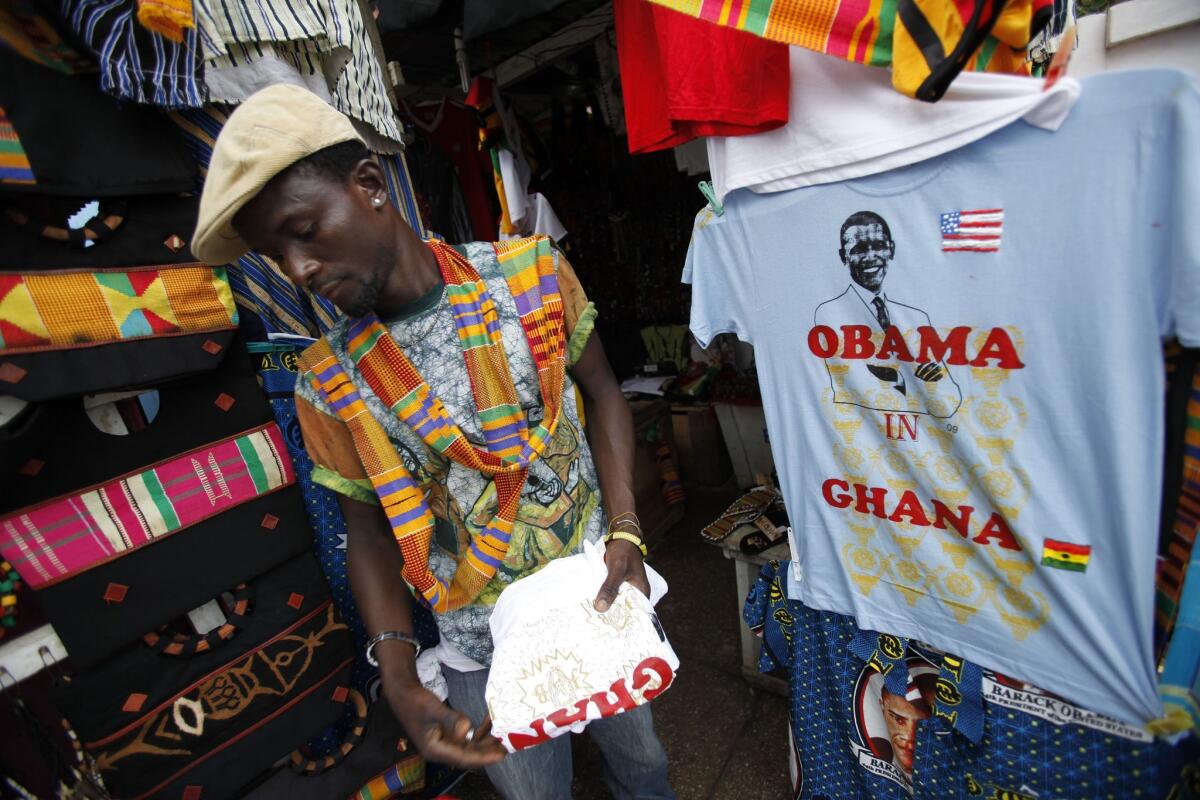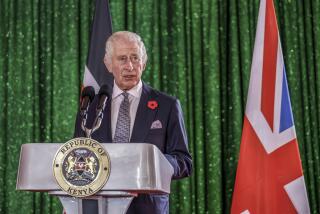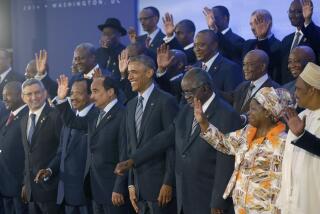From the archives:: Kenya feeling snubbed by favorite son Obama

A vendor folds tee-shirts commemorating U.S. President Barack Obama’s planned visit to Ghana, at a streetside stall in central Accra, Ghana Thursday, July 9, 2009.
- Share via
Reporting from NAIROBI, KENYA — Maybe having a favorite son in the White House isn’t all it’s cracked up to be.
When President Obama took office, ecstatic Kenyans predicted a new era of closer ties between the U.S. and the homeland of Obama’s late father. They envisioned increased trade and investment, improved diplomatic relations and the first-ever visit by a sitting U.S. president.
But a string of perceived slights and snubs over the last month is dampening initial expectations. For starters, the White House announced that Obama’s first visit as president to a sub-Saharan nation would take him to Ghana, not Kenya, in recognition of the West African nation’s continued democratic progress and recent peaceful election.
Then, when Kenyan Prime Minister Raila Odinga visited the U.S. last month, he wasn’t invited to the White House. Instead, the president of Tanzania, Kenya’s neighbor and rival, won the coveted spot as the first head of state or government from sub-Saharan Africa to sit down with Obama in the Oval Office.
And last week, the Homeland Security Department forced Delta Air Lines to delay its inauguration of a direct U.S.-Kenya route because of unspecified security concerns.
“This is not a very friendly act,” Kenyan Foreign Minister Moses Wetangula said.
Though the flight is expected to debut shortly, negative publicity about Kenya’s security was another blow to the country’s sagging economy. The tourism industry is still struggling to recover from postelection riots in early 2008 that exposed deep-seated tribal tensions.
With the political “snubs” making front-page news in Kenya’s newspapers, one lawmaker is now calling for an inquiry into why Obama is skipping Kenya on his July trip and why Odinga failed to receive a White House invitation. (Odinga’s office insisted that the trip was personal and that he never expected to meet Obama.)
Some Kenyan leaders complain that the U.S. government isn’t giving their country due respect and that Obama has turned his back on his father’s native country.
But many say Kenya has only itself to blame.
“The message that Obama is sending to Kenyan leaders is that they should look deep in themselves and see what they are doing to the country,” political analyst Michael Tiampati said in Nairobi, the capital. “He is urging them to reform. But all we are seeing is the political elite dragging its feet.”
Since the disputed presidential election brought Kenya’s democracy to the brink of collapse, a fragile coalition government has failed to address most of the nation’s underlying problems, including tribalism, landownership arguments, an outdated constitution and an abusive police force that was blamed for about half of the 1,000 deaths during the violence.
The government has failed to implement most of the recommendations of a variety of international and domestic commissions convened to help restore peace and security. Last week, it rejected calls from a United Nations human rights envoy to fire the nation’s police chief and attorney general because they had failed to stop extrajudicial killings.
In March, two human rights activists were shot to death by unknown assailants shortly after speaking out against police brutality.
At the same time, government corruption is rising again, as are fears the unity government might break apart before the next election.
Some in Kenya say that what the country really needs is to better refine its message to the world. So the government is planning to hire a public relations and lobbying firm in Washington.
But Dennis Onyango, the prime minister’s spokesman, said only domestic reforms would improve Kenya’s international reputation.
“We have to sort out our own issues, and that work has to be done from here,” he said. “Once we do that, we won’t have image problems.”
More to Read
Sign up for Essential California
The most important California stories and recommendations in your inbox every morning.
You may occasionally receive promotional content from the Los Angeles Times.










